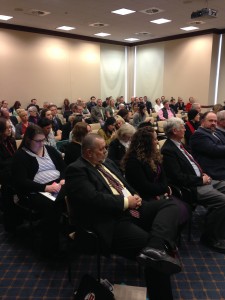SALT LAKE CITY — Two bills seeking to legalize the use of medical cannabis passed through Senate legislative committees on Thursday and will be discussed by the full Utah Senate in coming days.
Hundreds of people gathered at the state Capitol to voice their opinions on the polarizing topic. Overflows were setup with broadcasts of committee presentations featured in different rooms on Capitol Hill. Two separate public hearings lasted for a total of four hours.
The two bills differ in the amount and availability of medical cannabis to Utah patients.
Sen. Evan Vickers, R-Cedar City, presented the more conservative of the two bills.
SB89, titled Medical Cannabidiol Amendments, legalizes cannabidiol (CBD) but not tetrahydrocannabinol. (THC)
CBD and THC are two main components of the marijuana plant. The CBD component of marijuana does not provide a psychoactive high that THC does. Vickers bill proposes only allowing the making of a product that would feature a 10:1 ratio of CBD strain to THC within the product. So the medical product would not provide a high.
Vickers, a pharmacist, co-authored the bill along with Rep. Brad Daw, R-Orem.

“If it is a medicine, treat it like a medicine.” Vickers said, “We have kept that one thought in mind throughout the entire process. Another clear factor is the need for additional research as we move forward. “
Vickers’ bill is very restrictive in many ways. For one, the bill would allow only for two marijuana cultivators in the state. Both would be highly regulated including in their disposal of the leftover plants, once the CBD is extracted from the plant.
The bill also allows for counties and cities within Utah to legislate their own bans on cannabidiol, meaning that even if passed the product could be restricted in certain parts of Utah.
Additional licensing would also be required for doctors who prescribe the use of cannabidiol. Patients and doctors would be encouraged to make themselves available for further research.
“One of our goals in this bill is to say, let’s find out what we don’t know,” said Daw. “Let’s make sure research is paramount in this bill.”
Several experts voiced their support of the bill, including: Perry Fine a doctor and professor of anesthesiology at the University of Utah; Doctor James Davis of Utah State University, and Doctor William Hamilton, President of Utah Medical Association.
SB89 is admittedly, a more conservative approach to medical cannabis use.
“Many people are looking at this from a very emotional side.” Vickers Said “We have tried very hard to stick to the medical side only, we felt like we needed to be very careful.”

The other bill, SB73, takes a more liberal approach to the control of medical marijuana. Emotion is an important component of the other Senate bill concerning medical cannabis. Sen. Mark Madsen, R-Saratoga Springs, is the sponsor of SB73 known as the Medical Cannabis Act.
“Our government (is) keeping relief from others, that (are) suffering much more than I,” Madsen said. “I think of parents and caregivers. I hope I’m never part of the small percentage that needs this bill. I’m very sympathetic.”
Madsen and doctors supporting his bill note that medicine without THC won’t always provide relief for patients. Madsen supports the use of “whole plant” medication.
Madsen cited a bill passed last year that gave cannabidiol as a treatment for epilepsy in Utah children. Madsen noted that of the 130 who signed up for the program, only 80 came back. “45 percent of patients need another component that nature places in the medicine, that is THC,” Madsen said.
The Medical Cannabis Act featured many testimonials. Dr. Michael Holmstrom gave his testimonial via Skype to the committee. Holmstrom focused on how the legalization of marijuana would decrease abuse of opioids, such as oxycodone and morphine.
Holmstrom stated that overdose causes more deaths in Utah than motor vehicle deaths and firearm deaths. Holmstrom also noted that many opioids have a fairly high risk of overdose, where marijuana overdose is nearly impossible, and there have been no reported cases of marijuana overdose in the U.S. ever.
“(Medical marijuana) can treat the 80,000-100,000 Utahns who use opioids on a daily basis,” concluded Holmstrom.
Additional professionals supported Madsen’s bill, including Dr. Steve Pulley, Dr. Legrand Belnap, and Dr. Daniel Cottom. Although Cottom favors the Medical Cannabis Act over the Medical Cannabidiol Amendments; he does think that separating strains of the plant may become a future part of medicine.
“I foresee a day when isolating the plant happens and is better but for now I don’t approve,” Cottom said.
Besides professional witnesses, patients weighed in too. Kenneth Thomason a six-year cancer patient testified of the damage that opioid and other prescribed drug use did to his body. Thomason said using marijuana helped him stabilize both emotionally and physically and is in full support of the Medical Cannabis Act.
“If I can do anything in my life, it’s to leave a legacy for all the cancer patients that are going to come behind me,” Thomason said..
Madsen feels the benefits of marijuana outweigh the potential pitfalls of legalizing the plant for medical use.
“It is about limited government, individual liberty to own their lives,” argued Madsen. “It’s not appropriate to say that, because someone may (potentially) abuse (marijuana), then other people should not have access to it.”
Posted Feb. 5, 2016




